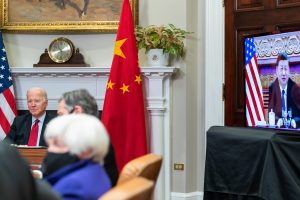Americans are increasingly seeing China as a world superpower and a threat, though growing numbers perceive it more as a competitor than an enemy, according to a survey released Thursday.
The Washington-based Pew Research Center said that negative views of China reached a new high, with 82 percent of Americans having either somewhat unfavorable or very unfavorable views of the country, a 6 percentage point increase from last year.
About two-thirds of U.S. adults said that China’s influence in the world is getting stronger, and two-thirds also consider China’s power and influence a major threat to the United States.
At the same time, the proportion of respondents who saw China as an enemy has dropped since January. Currently, 62 percent of Americans see China as a competitor and 25 percent as an enemy, while in January 54 percent chose competitor and 35 percent said enemy — almost exactly the same as the prior year.
The shift may be a temporary one influenced by Russia’s invasion of Ukraine. Laura Silver, a senior researcher at Pew, said it’s likely that the war has changed how people define what is an enemy, as opposed to a competitor.
The survey of 3,581 people was taken from March 21 to 27, about a month into the Russian invasion. The margin of error was plus or minus 2.3 percentage points.
The opposite shift occurred in the share of Americans who called Russia an enemy. Some 70 percent of Americans now see Russia as an enemy, up from 41 percent in January, according to Pew.
“With a clearer sense that what Russia is doing demarcates it as an ‘enemy,’ there has been a corresponding shift in thinking China is more of a competitor,” Silver said.
On the official level, however, U.S. Secretary of Defense Lloyd Austin calls China the U.S. military’s leading long-term challenge and the U.S.-China relationship has become more strained on many levels since the start of President Joe Biden’s term in January 2021.
Biden has been placing more emphasis on the Indo-Pacific region and has repeatedly criticized China for military provocations against Taiwan, human rights abuses against ethnic minorities and efforts to squelch pro-democracy advocates in Hong Kong. U.S. officials also have expressed concern about signs that China is increasing the size of its nuclear arsenal, although it remains far smaller than America’s.
With China so far refusing to condemn the invasion of Ukraine, Beijing’s partnership with Moscow was identified as the most serious problem for the U.S., with 62 percent of people polled saying it was.
By contrast, only 35 percent said the tensions between China and Taiwan were a very serious problem for the U.S. China’s human right policies were named a very serious problem by 42 percent, and 26 percent said mainland China’s Hong Kong policies were a very serious problem for the U.S.
Silver said that changes in news coverage and global events probably affect how Americans view China, noting that human rights was a greater concern last year.
“Negative views of China have been high and growing for much of the last four years but what factors seem most salient has ebbed and flowed,” Silver said.

































